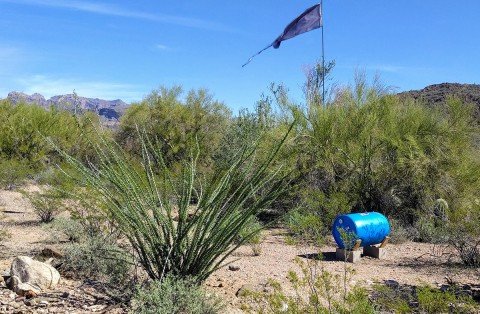Why is the Border Patrol undermining humanitarian aid efforts at the southern border?
In July, agents raided a No More Deaths aid station—and 26 bodies were found in the desert.

In July during a record-setting heat wave, 26 human bodies were found in the desert between the US and Mexico. Nine had been dead less than a day. Mike Kreyche, who monitors these deaths for the humanitarian aid organization Humane Borders, said it was the largest one-month total in his five years of data collecting. The heat is one factor. Midsummer is the deadliest time to try to cross this border, and temperatures were above 100 for many days in a row. But there is another important factor: the politicization of the Border Patrol.
In recent years the relationships between the Border Patrol and groups that provide humanitarian aid have become increasingly antagonized. While humanitarian workers have remained focused on their nonviolent mission of providing aid, numerous volunteers have been arrested and charged with everything from littering to conspiracy. On July 31 Border Patrol agents raided the permanent aid station in Arizona run by No More Deaths, a ministry of the Unitarian Universalist church. They confiscated paperwork and cell phones, zip-tied volunteers, and arrested people seeking medical care. Group members saw this action as apparent retaliation for No More Deaths’s release of documents related to Border Patrol actions during the protests in Portland. This action, whatever its motivation, is disturbing, but it is only one example of ways that the Border Patrol has sought to undermine humanitarian aid that saves lives. Why?
The clearest answer is a chilling one: the US is following a policy of “deterrence by death.” US District Judge Rosemary Márquez used these words in a recent ruling in which she overturned the convictions of four No More Deaths volunteers. Brandon Judd, the head of the Border Patrol’s union, the National Border Patrol Council, indeed echoed what the judge called this “gruesome logic” in his testimony before Congress in 2016. He argued that the US had to make the costs of crossing the border higher than the benefits. The July tally of bodies reminds us that one of those costs has routinely been death, in ever higher numbers.
Antagonism between aid workers and the government is not a foregone conclusion. As recently as 2013, No More Deaths and the Border Patrol signed a mutual agreement that protected volunteers from arrest for offering humanitarian aid, and said that medical aid would be “recognized and respected by government agents, and should be protected from surveillance and interference.” Agents have violated that agreement in increasing measures since 2017.
Border Patrol agents could, in theory, work with humanitarian aid workers for a safe and effective border enforcement policy that values human life above all. A moderate view would recognize the need for patrolling the border while prioritizing and prizing human life. It would not actively seek to destroy, punish, or deter those who offer aid but to collaborate in an effort to keep people alive. This is one of the primary callings of law enforcement, after all, and one that seems to have been forgotten in the struggle over immigration policy.
A version of this article appears in the print edition under the title “Deaths in the desert.”





